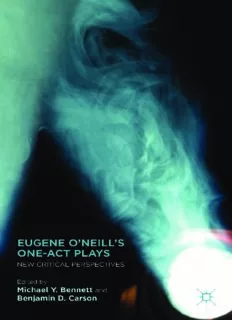
Eugene O'Neill's One-Act Plays: New Critical Perspectives PDF
Preview Eugene O'Neill's One-Act Plays: New Critical Perspectives
Eugene O’Neill’s One- Act Plays Previous Publications Michael Y. Bennett Reassessing the Theatre of the Absurd: Camus, Beckett, Ionesco, Genet, and Pinter Words, Space, and the Audience: The Theatrical Tension between Empir- icism and Rationalism Refiguring Oscar Wilde’s Salome (editor) Benjamin D. Carson Sovereignty, Separatism, and Survivance: Ideological Encounters in the Literature of Native North America (editor) Eugene O’Neill’s One- Act Plays New Critical Perspectives Edited by Michael Y. Bennett and Benjamin D. Carson EUGENE O’NEILL’S ONE-A CT PLAYS Copyright © Michael Y. Bennett and Benjamin D. Carson, 2012. All rights reserved. First published in 2012 by PALGRAVE MACMILLAN® in the United States— a division of St. Martin’s Press LLC, 175 Fifth Avenue, New York, NY 10010. Where this book is distributed in the UK, Europe and the rest of the world, this is by Palgrave Macmillan, a division of Macmillan Publishers Limited, registered in England, company number 785998, of Houndmills, Basingstoke, Hampshire RG21 6XS. Palgrave Macmillan is the global academic imprint of the above companies and has companies and representatives throughout the world. Palgrave® and Macmillan® are registered trademarks in the United States, the United Kingdom, Europe and other countries. ISBN: 978- 0- 230- 33981- 1 Library of Congress Cataloging-in-Publication Data Eugene O’Neill’s one-act plays : new critical perspectives / edited by Michael Y. Bennett, Benjamin D. Carson. p. cm. ISBN 978-0-230-33981-1 (hardback) 1. O’Neill, Eugene, 1888-1953—Criticism and interpretation. 2. American drama—20th century—Social aspects. I. Bennett, Michael Y., 1980– II. Carson, Benjamin D. PS3529.N5Z639 2012 812'.52 —dc23 2012002675 A catalogue record of the book is available from the British Library. Design by Scribe Inc. First edition: August 2012 10 9 8 7 6 5 4 3 2 1 Printed in the United States of America. To Ben’s mentor, Frank R. Cunningham, and Michael’s mentor, Robert Combs, who showed us O’Neill’s “native eloquence” and taught us so much more Contents Essay Abstracts ix Introduction 1 1 The Playwright’s Theatre: O’Neill’s Use of the Provincetown Players as a One- Act Laboratory 17 Jeff Kennedy 2 Rethinking O’Neill’s Beginnings: Slumming, Sociology, and Sensationalism in The Web 35 J. Chris Westgate 3 Eugene O’Neill’s Abortion and Standard Family Roles: The Economics of Terminating a Romance and a Pregnancy 51 Lesley Broder 4 The Movie Man: The Failure of Aesthetics? 67 Thierry Dubost 5 “God Stiffen Us”: Queering O’Neill’s Sea Plays 81 Phillip Barnhart 6 Epistemological Crises in O’Neill’s SS Glencairn Plays 97 Michael Y. Bennett 7 “The Curtain Is Lowered”: Self- Revelation and the Problem of Form in Exorcism 113 Kurt Eisen 8 “Ain’t Nothin’ Dere but de Trees!”: Ghosts and the Forest in The Emperor Jones 129 Paul D. Streufert viii Contents 9 Neither Fallen Angel nor Risen Ape: Desentimentalizing Robert Smith 145 Thomas F. Connolly 10 Waiting for O’Neill: The Makings of an Existentialist 163 Steven F. Bloom 11 O’Neill’s Hughie: The Sea Plays Revisited 175 Robert Combs 12 Condensed Comedy: The Neo- Futurists Perform O’Neill’s Stage Directions 193 Zander Brietzke Notes on the Authors 203 Index 207 Essay Abstracts “The Playwright’s Theatre: O’Neill’s Use of the Provincetown Players as a One- Act Laboratory” by Jeff Kennedy When the Provincetown Players formally organized in September of 1916, playwright Eugene O’Neill insisted on one thing: that they name the playhouse “The Playwright’s Theatre.” O’Neill set about writing plays that in performance would help answer questions he had as a playwright, something like a self- imposed curriculum to inform his work. He believed that this amateur company committed to exper- imenting, and toward the creation of an American identity in theatre, would allow him to test his ideas. Early on, O’Neill exited the daily workings of the Players to concentrate on his writing and maintained a relationship with the Players unlike anyone who called themselves a member of the company. This essay examines the experimentation in his one-a ct plays performed by the Provincetown Players and how his relationship with the group evolved in the process. “Rethinking O’Neill’s Beginnings: Slumming, Sociology, and Sensa- tionalism in The Web” by J. Chris Westgate Offering a rebuttal to the ahistoricism that governs so much of the criticism on Eugene O’Neill, this essay situates O’Neill’s origins firmly in the Progressive Era. This essay demonstrates that The Web, O’Neill’s first play, reflects a central concern of theater from this period: ethically conflicted depictions of New York lowlife. On the one hand, The Web attempts a sociological reading of the conditions of prostitutes, concentrating on how poverty becomes a “category of social being” that defines material circumstances and psychological well- being. On the other hand, The Web’s melodramatic design poten- tially turns Rose’s plight into slumming, a popular pastime wherein the wealthy observed the underworld for excitement and titillation.
Description: